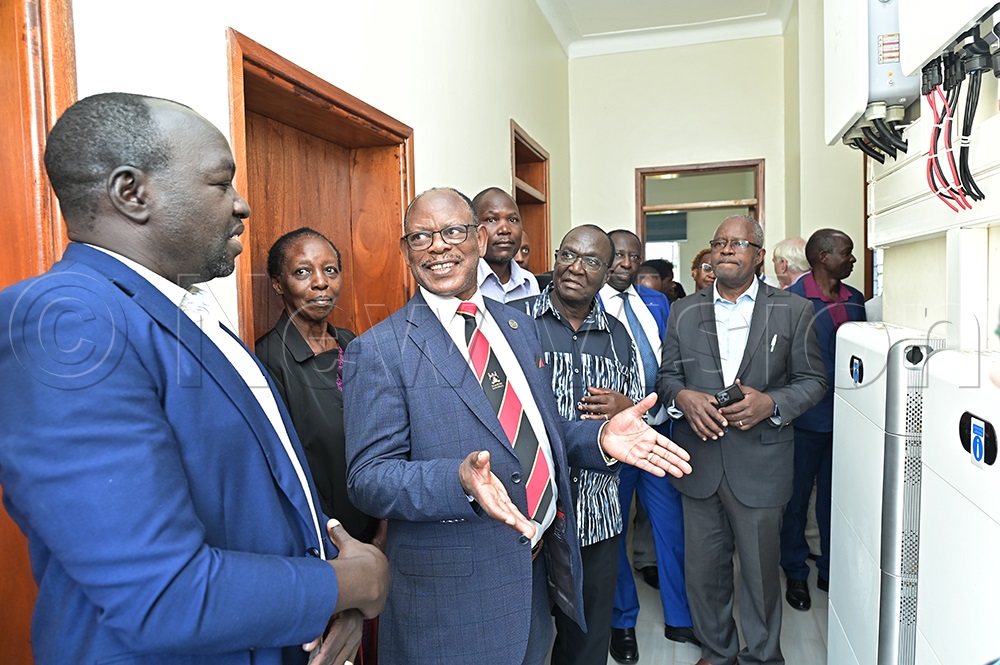Makerere University opens Kalangala’s first Clinical Research Centre
While launching the facility on Thursday, November 20, Makerere University Vice Chancellor, Prof. Barnabas Nawangwe, said Kalangala, an idyllic archipelago often romanticised for its sunsets, today witnessed a historic leap in healthcare
Nawangwe opens new Clinical Research Centre in Kalangala. (Credit: Juliet Waiswa)
________________
Makerere University has launched Kalangala’s first clinical research centre. This means that patients will no longer have to travel long distances for advanced care.
While launching the facility on Thursday, November 20, Makerere University Vice Chancellor, Prof. Barnabas Nawangwe, said Kalangala, an idyllic archipelago often romanticised for its sunsets, today witnessed a historic leap in healthcare
Kalangala Clinical Research Centre by Makerere University Infectious Diseases Institute (IDI) is the island’s first modern research facility.
Makerere University, ranked 2nd in Africa and 63rd globally, continues to cement its reputation as a hub for research collaboration, technology transfer, and innovation. “This is more than a building; it’s a lifeline,” said Prof. Nawangwe. “IDI is not only Uganda’s leading health partner, managing over 20% of HIV cases, but research is first on its agenda. If people are not healthy, they can’t work; it is useless to invest in anything else.”
Nawangwe opens new Clinical Research Centre in Kalangala. (Credit: Juliet Waiswa)
The university is ranked 2nd in Africa and 63rd globally, and continues to cement its reputation as a hub for research collaboration, technology transfer, and innovation.
“This is more than a building; it’s a lifeline,” said Prof. Nawangwe. “IDI is not only Uganda’s leading health partner, managing over 20% of HIV cases, but research is first on its agenda.
If people are not healthy, they can’t work; it’s useless to invest in anything else,” he added
To the people of Kalangala, the Centre, according to Nawangwe, brings much-needed medical services, including the use of drones for the distribution of medicines. “This centre means access without barriers, Kalangala residents no longer need to travel long distances for clinical trials or advanced care," said Dr Andrew Kambugu, IDI Executive Director.
“Kalangala ranks third in HIV prevalence nationwide at 13.1%, with fishing communities hardest hit. Until now, residents endured perilous boat rides to the mainland for advanced care. “Accessing healthcare has always meant a journey across waves long, costly, and sometimes dangerous,” said District Chairperson Jajab Ssemakula. “You have not only invested in Kalangala; you have brought Makerere University to Kalangala.”
Supported by the Gates Foundation, the centre joins a multinational HIV prevention study across 31 sites in Kenya, South Africa, and Uganda. Its first mission: testing whether a monthly pill can protect adolescent girls and young women from HIV, a breakthrough that could transform vulnerable communities.
Prof. Samuel Luboga, IDI Board Chairperson, reassured residents of IDI’s long-term commitment:
“We are not a fleeting partner. This sentinel research centre aligns with our vision of freeing Africa from the burden of infectious diseases. The assurance I give Kalangala is—we are here to stay.”
Henry Ssebunya, Deputy Resident District Commissioner, praised IDI’s innovation and consistency:
“IDI has treated and cared for people living with HIV, deployed medical drones to deliver life-saving medicines, and now built a research centre. This is a new chapter for Kalangala.”
From a sleeping sickness camp in 1906 to a cutting-edge research hub in 2025, Kalangala’s story is one of resilience, innovation, and hope.," he added.
Kalangala ranks third in HIV prevalence nationwide at 13.1%, with fishing communities hardest hit. Until now, residents’ endured unsafe boat rides to the mainland for advanced care. “Accessing healthcare has always meant a journey across waves long, costly, and sometimes dangerous,” said District Chairperson Jajab Ssemakula.
Ssemakula said, “You have not only invested in Kalangala; you have brought Makerere University to Kalangala.”
Supported by the Gates Foundation, the centre joins a multinational HIV prevention study across 31 sites in Kenya, South Africa, and Uganda. Its first mission: testing whether a monthly pill can protect adolescent girls and young women from HIV a breakthrough that could transform vulnerable communities.
“This centre means access without barriers,” said Dr Andrew Kambugu, IDI Executive Director. “Kalangala residents no longer need to travel long distances for clinical trials or advanced care.”
Prof. Samuel Luboga, IDI Board Chairperson, reassured residents of IDI’s long-term commitment:
“We are not a fleeting partner. This sentinel research centre aligns with our vision of freeing Africa from the burden of infectious diseases. The assurance I give Kalangala is we are here to stay.”
Henry Ssebunya, Deputy Resident District Commissioner, praised IDI’s innovation and consistency:
“IDI has treated and cared for people living with HIV, deployed medical drones to deliver life-saving medicines, and now built a research centre. This is a new chapter for Kalangala.”
From a sleeping sickness camp in 1906 to a cutting-edge research hub in 2025, Kalangala’s story is one of resilience, innovation, and hope.